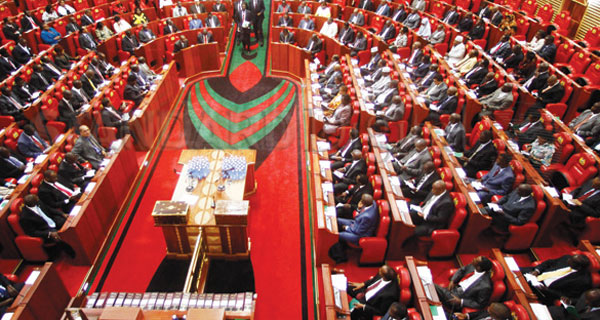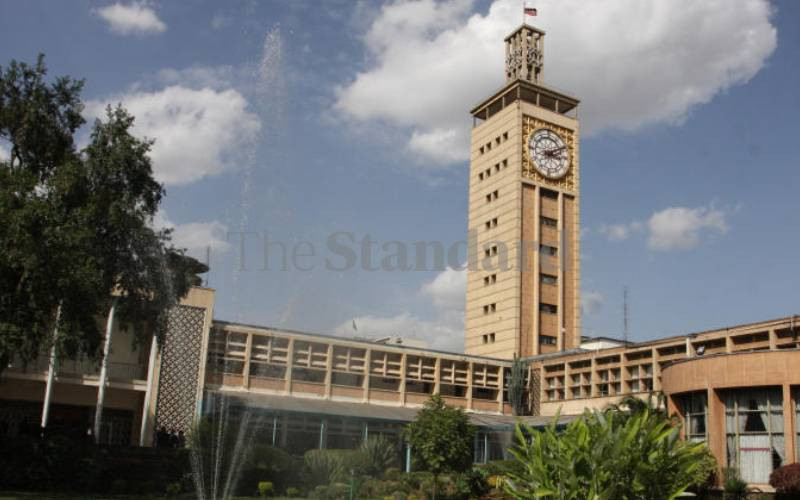 |
|
Parliament in session. |
By Michael Wesonga
Nairobi, Kenya: The Law Society of Kenya (LSK) has criticized Parliament for overriding their mandate by intruding into judiciary’s independence.
Deputy chair Lilian Renee Omondi said the Judiciary’s decisions could not be questioned because it was an independent body clearly defined in the constitution.
Miss Omondi cautioned Parliament against issuing threats to the judicial body with renewed clamor for judicial vetting.
She insisted that the high court had the mandate to interpret the law on it discretion without coercion and unsatisfied persons should follow due process by appealing at the court of appeal and supreme court.
“They cannot do that especially now that we have working institutions, unless they want us to go back to a referendum, if they have any complaints they should be directed to the Judicial Service Commission that will commence disciplinary measures if need be,” Omondi advised.
Omondi clarified that it is wrong in law to assume that the case will automatically act in favor of the person issued with temporary reprieve.
LSK North Rift Chairman David Rioba Omboto said the laws of the land are supreme and must be obeyed at the first instance without contention.
Mr. Omboto noted that it would be counterproductive for them to insinuate otherwise because the judicial system merely enforce the laws enacted by the legislators.
The advocate observed parliament’s attack on the judiciary was not just in bad faith but contrary to the rule of law in any democracy with regard to separation of powers.
“They cannot purport not to be bound by a court order especially if it is a temporary order that seeks interpretation of the law,” he stated.
Kerugoya High Court ruling reinstated impeached Governor Martin Wambora as governor of Embu County until his petition is heard and determined.
A situation that is burgeoning into a constitutional crisis pitting parliament against the judiciary as part of a series of supremacy contests between governors, the senate and parliament.
Omboto insisted that rule of natural justice offers that courts can extend reprieve to anyone at the first instance as it did to Wambora mostly through an injunction that can only last for fourteen days until the case is determined and thus no cause for alarm.
“This is until both parties are heard after making their submissions and the court decides whether to discharge or carry on with the case in prudent jurisprudence,” he explained.
Stay informed. Subscribe to our newsletter
Council member Godfrey Nathan Kitiwa said that both parliament and senate must draw a clear line of separation between their legislative powers and quasi-judicial roles touching on the rights of individuals.
“You cannot stop parliament or senate from passing a law because it is their legislative role, you will have to wait until it is passed and challenge it on grounds of unconstitutionality,” he added.
The advocate advised that the best thing for the senate was to obey the court order sought by the governors seeking an injunction against senate’s summonses.
Kitiwa argued that the court was the only authority in the land that could issue orders and only does so after being satisfied that there is need for action.
 The Standard Group Plc is a
multi-media organization with investments in media platforms spanning newspaper
print operations, television, radio broadcasting, digital and online services. The
Standard Group is recognized as a leading multi-media house in Kenya with a key
influence in matters of national and international interest.
The Standard Group Plc is a
multi-media organization with investments in media platforms spanning newspaper
print operations, television, radio broadcasting, digital and online services. The
Standard Group is recognized as a leading multi-media house in Kenya with a key
influence in matters of national and international interest.
 The Standard Group Plc is a
multi-media organization with investments in media platforms spanning newspaper
print operations, television, radio broadcasting, digital and online services. The
Standard Group is recognized as a leading multi-media house in Kenya with a key
influence in matters of national and international interest.
The Standard Group Plc is a
multi-media organization with investments in media platforms spanning newspaper
print operations, television, radio broadcasting, digital and online services. The
Standard Group is recognized as a leading multi-media house in Kenya with a key
influence in matters of national and international interest.








